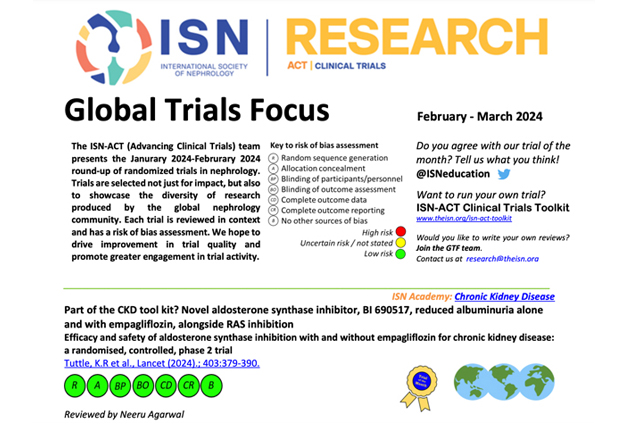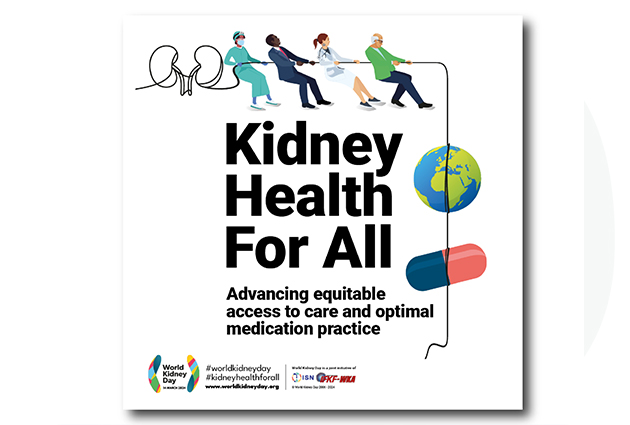Explore the ISN Global Trials Focus Selection for February and March, Featuring a “Trial of the Month” on the Efficacy and Safety of Aldosterone Synthase Inhibition
ISN-ACT Global Trials Focus editorial team member Neeru Agarwal summarizes the design and outcomes of the latest ISN-ACT Global Trials Focus ”Trial of the Month.”
The “Trial of the Month” is available in several languages, now including German. Read all global trial selections from the ISN-ACT initiative here. In addition, selected clinical trials are demystified for the layperson.
Part of the CKD Tool Kit? Novel Aldosterone Synthase Inhibitor, BI 690517, Reduced Albuminuria Alone and With Empagliflozin, Alongside RAS Inhibition
Efficacy and safety of aldosterone synthase inhibition with and without empagliflozin for chronic kidney disease: a randomized, controlled, phase 2 trial
Tuttle, K.R et al., Lancet (2024).; 403:379-390.
Summary:
BI 690517 is a potent and highly selective inhibitor of aldosterone synthase that directly lowers aldosterone production, potentially slowing the progression of chronic kidney disease (CKD) by decreasing kidney inflammation and fibrosis.
This phase 2, placebo-controlled, double-blind study evaluated the efficacy and safety of various oral doses of BI 690517 alone or combined with empagliflozin, a sodium-glucose cotransporter 2 inhibitor (SGLT-2i), in participants with CKD (eGFR 30-90ml/min/1.73m2 ) regardless of diabetes status and with a urine albumin to creatinine ratio (uACR) between 200-5000mg/g, and serum potassium ≤4.8mmol/L, who were on stable renin-angiotensin system inhibitor (RASi) therapy.
Participants were initially randomized (n = 714, 1:1) to 10mg empagliflozin or placebo for eight weeks, followed by a second randomization (n = 586, 1:1:1:1) for 14 weeks with BI 690517 treatment at doses 3mg, 10mg or 20mg daily, or placebo.
The percentage change in first morning void uACR from baseline (second randomization) to week 14 was –3% (95% CI –19 to 17) with placebo, –22% (–36 to –7) with BI 690517 3 mg, –39% (–50 to –26) with BI 690517 10 mg, and –37% (–49 to –22) with BI 690517 20 mg monotherapy. Similar uACR reductions were observed when BI 690517 was added to empagliflozin (-11%, – 19%, -46%, and -40% for placebo, 3mg, 10mg, and 20mg BI 690517 doses, respectively). Of note, among participants receiving the BI 690517 10mg dose, 51% achieved a uACR reduction of ³30% on monotherapy (OR vs. placebo 6.09; 95% CI 2.64– 14.08) and 70% achieved this reduction with empagliflozin added to Bl 690517 (OR vs. placebo 8.42; 3.73–19.02).
In terms of safety, BI 690517 had an acceptable safety profile. Although there was a dose-dependent increase in hyperkalemia compared to placebo, most cases did not require medical intervention or discontinuation of the drug, and this increase was possibly reduced in the presence of empagliflozin.
Commentary:
The current treatment landscape for slowing the progression of CKD includes the use of RASi and SGLT2i. Furthermore, newer non-steroidal mineralocorticoid receptor antagonists (nsMRAs) have been shown to provide additional cardiac and kidney protection in individuals with diabetic kidney disease.
BI 690517 has a different mechanism of action from RASi and nsMRAs in that it directly lowers aldosterone production. In this context, this trial uniquely shows the additive benefit of combination therapy in CKD by initially having a run-in period and randomizing individuals to SGLT-2i in addition to RASi.
The trial then goes on to demonstrate clinically meaningful placebo-corrected reductions in microalbuminuria of up to 37-40% on BI 690517 treatment with dose-response plateauing at 10mg, regardless of empagliflozin use.
This trial is, however, limited by its brief follow-up of only 14 weeks, which may restrict the understanding of the safety of this new drug. Also, the study population was predominantly White and male and excluded patients who were eligible for MRAs, limiting its generalizability.
Nevertheless, this drug warrants further study in a large phase 3 trial to assess long-term kidney and cardiac benefits, and comparative effectiveness studies comparing nsMRAs with aldosterone synthase inhibitors in CKD might provide better guidance on when to initiate such treatments.










